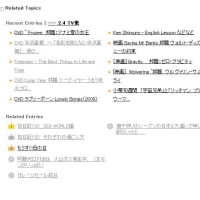Long Tail Worldにあった『今日から幸せになれる5つの方法』は
久しぶりにメモの価値あり+永久保存版と思ったHow-toものでした。
とくに、一番と二番。
幸せになるために毎日できることは、
『(逆説的だけど)辛い感情を受け入れること』
誰でもできる具体的なことは...『 時間。自分が大切にしている人、
自分を大切に思ってくれる人と一緒にクオリティータイムを過ごすこと』
自分の将来について人並みに考えるところがあるのですが、
ここに書いてあることを指針としていけば
回答を出すことができそうな気もしました。
ただ、行動を起こすといろいろと余波があり
それを予測できないことに不安があります。
それは当然のことなのですけどね。
あと、今の時代、特に重要な幸せ術は
『物事をシンプルにし、ひとつひとつにベストを尽くすこと』
今、こうなりたい、と希望していることのひとつに、
持ち物を少なくする、ということがあります。 (難しいです)
オリジナルがありました。
さとみさんの翻訳はすごいですね。
Question: What can people do each day to be happier?
Tal Ben-Shahar: The first thing to do to become happier, paradoxically, is to accept painful emotions, to accept them as a part of being alive. You know, there are two kinds of people who don't experience painful emotions such as anxiety or disappointment, sadness, envy; two kinds of people who don't experience these painful emotions. They are the psychopaths and the dead. So if we experience painful emotions at time, it's actually a good sign. It means that we're not a psychopath and we're alive. The paradox is that when we give ourselves the permission to be human, the permission to experience the full gamut of human emotion. We open ourselves up to positive emotions as well.
Question: Are there specific things people can do?
Tal Ben-Shahar: Then I think -- yeah. Some specific examples, exactly. The number one predictor of well-being of happiness is time, quality time, we spend with our family, friends, people we care about and who care about us. In our modern world, unfortunately this quality time is erroding. A very good predictor of well-being is what psychologist Tim Kasser calls time affluence. Time affluence is the thing that we have time to sit down and chat with our friends while -- not while being on the phone at the same time or text messaging at the same time, being with that person. This is a better predictor.
Physical exercise contributes a great deal to happiness; in fact, there is research showing that regular exercise, three times a week for 30 to 40 minutes of aerobic exercise, could be jogging or walking or aerobics or dancing, three times a week of 30 to 40 minutes of exercise is equivalent to some of our most powerful psychiatric drugs in dealing with depression or sadness or anxiety. We've become a sedentary culture where we park our car next to our workplace or take the train and we don't walk like our fore parents used to. Thousands of years ago our fore parents walked an average of eight miles a day. How far do we walk today? Well it depends on where we park our car. And we pay a high price for it because we weren't made to be to sedentary. We were made to be physically active.
Question: How can we cultivate gratitude?
Tal Ben-Shahar: There are treasures of happiness all around us and within us. The problem is that we only appreciate them when something terrible happens. Usually when we become sick, we appreciate our health. When we lose someone dear to us, we appreciate our life. And we don't need to wait. If we cultivate the habit of gratitude we can significantly increase our levels of happiness. So, for example, research by Robert **** and Mike McAuliffe shows that people who keep a gratitude journal, who each night before going to sleep write at least five things for which they are grateful, big things or little things, are happier, more optimistic, more successful, more likely to achieve their goals, physically healthier; it actually strengthens our immune system, and are more generous and benevolent toward others. This is an intervention that takes three minutes a day with significant positive ramifications.
Question: What happiness techniques are particularly important in today’s world?
Tal Ben-Shahar: Okay. Sorry. One of the most important things that we can do in our modern world is to simplify, to do less rather than more. The problem is that we try and cram more and more things into less and less time, and we pay a price. We pay a price in terms of the quality of the work that we do. We also pay a price in terms of the quality of relationships that we enjoy. So doing less -- for example, switching our phone off for three hours when we get home, or not responding to every e-mail as it arrives, having what I call e-mail-free zones -- these little things, simplifying our lives even slightly, can make a significant difference to our productivity as well as happiness.
Recorded on: September 23, 2009
久しぶりにメモの価値あり+永久保存版と思ったHow-toものでした。
とくに、一番と二番。
幸せになるために毎日できることは、
『(逆説的だけど)辛い感情を受け入れること』
誰でもできる具体的なことは...『 時間。自分が大切にしている人、
自分を大切に思ってくれる人と一緒にクオリティータイムを過ごすこと』
自分の将来について人並みに考えるところがあるのですが、
ここに書いてあることを指針としていけば
回答を出すことができそうな気もしました。
ただ、行動を起こすといろいろと余波があり
それを予測できないことに不安があります。
それは当然のことなのですけどね。
あと、今の時代、特に重要な幸せ術は
『物事をシンプルにし、ひとつひとつにベストを尽くすこと』
今、こうなりたい、と希望していることのひとつに、
持ち物を少なくする、ということがあります。 (難しいです)
オリジナルがありました。
さとみさんの翻訳はすごいですね。
Question: What can people do each day to be happier?
Tal Ben-Shahar: The first thing to do to become happier, paradoxically, is to accept painful emotions, to accept them as a part of being alive. You know, there are two kinds of people who don't experience painful emotions such as anxiety or disappointment, sadness, envy; two kinds of people who don't experience these painful emotions. They are the psychopaths and the dead. So if we experience painful emotions at time, it's actually a good sign. It means that we're not a psychopath and we're alive. The paradox is that when we give ourselves the permission to be human, the permission to experience the full gamut of human emotion. We open ourselves up to positive emotions as well.
Question: Are there specific things people can do?
Tal Ben-Shahar: Then I think -- yeah. Some specific examples, exactly. The number one predictor of well-being of happiness is time, quality time, we spend with our family, friends, people we care about and who care about us. In our modern world, unfortunately this quality time is erroding. A very good predictor of well-being is what psychologist Tim Kasser calls time affluence. Time affluence is the thing that we have time to sit down and chat with our friends while -- not while being on the phone at the same time or text messaging at the same time, being with that person. This is a better predictor.
Physical exercise contributes a great deal to happiness; in fact, there is research showing that regular exercise, three times a week for 30 to 40 minutes of aerobic exercise, could be jogging or walking or aerobics or dancing, three times a week of 30 to 40 minutes of exercise is equivalent to some of our most powerful psychiatric drugs in dealing with depression or sadness or anxiety. We've become a sedentary culture where we park our car next to our workplace or take the train and we don't walk like our fore parents used to. Thousands of years ago our fore parents walked an average of eight miles a day. How far do we walk today? Well it depends on where we park our car. And we pay a high price for it because we weren't made to be to sedentary. We were made to be physically active.
Question: How can we cultivate gratitude?
Tal Ben-Shahar: There are treasures of happiness all around us and within us. The problem is that we only appreciate them when something terrible happens. Usually when we become sick, we appreciate our health. When we lose someone dear to us, we appreciate our life. And we don't need to wait. If we cultivate the habit of gratitude we can significantly increase our levels of happiness. So, for example, research by Robert **** and Mike McAuliffe shows that people who keep a gratitude journal, who each night before going to sleep write at least five things for which they are grateful, big things or little things, are happier, more optimistic, more successful, more likely to achieve their goals, physically healthier; it actually strengthens our immune system, and are more generous and benevolent toward others. This is an intervention that takes three minutes a day with significant positive ramifications.
Question: What happiness techniques are particularly important in today’s world?
Tal Ben-Shahar: Okay. Sorry. One of the most important things that we can do in our modern world is to simplify, to do less rather than more. The problem is that we try and cram more and more things into less and less time, and we pay a price. We pay a price in terms of the quality of the work that we do. We also pay a price in terms of the quality of relationships that we enjoy. So doing less -- for example, switching our phone off for three hours when we get home, or not responding to every e-mail as it arrives, having what I call e-mail-free zones -- these little things, simplifying our lives even slightly, can make a significant difference to our productivity as well as happiness.
Recorded on: September 23, 2009




















※コメント投稿者のブログIDはブログ作成者のみに通知されます